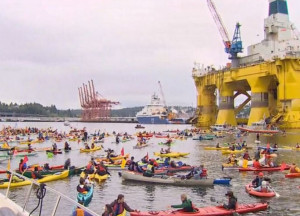Seattle just can’t stay out of the national news. The latest bug light for media everywhere was the colorful flotilla of kayaks and other vessels last month surrounding a Royal Dutch Shell oil rig docked at the Port of Seattle intended for deployment in Alaska. Seattle environmentalists are trying to stop new drilling for oil in the Arctic.
Given that most of the gasoline sold in SUV-heavy Seattle comes from oil taken from Alaska, this protest registered a significant reading on my hypocrisy meter. But it’s also interesting from a historical standpoint. For upwards of a century Seattle has been telling Alaska what to do, and Alaskans haven’t been too happy about it.
The Alaska-Seattle tension goes back to the Klondike gold rush of 1897, which brought tens of thousands of fortune-hunters to western Canada and Alaska through Seattle, the closest city with rail service and a year-round port. The trade created some early fortunes and established Seattle as a major city–and, some said, the puppeteer to Alaska’s puppet.
“The link became so strong that Alaska was long considered to be the personal property of Seattle and Seattleites.” This isn’t just my New To Seattle perspective. It’s a quote up right now on the official website of the City of Seattle–the same city whose leaders are trying to scuttle the oil rig siting–in an essay entitled “Brief History of Seattle.”
“The city of Seattle looks upon Alaska as one of its own children,” the American Forestry Association wrote barely a decade after the Gold Rush in 1909. Forty years later, in 1949, Kiplinger’s Personal Finance magazine had this to say about the relationship between Seattle and Alaska:
The historic monopoly which Seattle holds on the Alaskan trade is now worth $170 million annually. But she may lose this plum. Alaskans are determined to break the monopoly. Alaskan Governor Ernest Gruening, strongly supported by his people, has said: “Seattle has exploited Alaska long enough. Alaska is too important to the United States and the world to be tied economically to a single city. We shall use other ports as entrances to Alaska.”
The liberal Gruening–he previously was editor of The Nation–later became a U.S. senator. He was one of only two lawmakers who voted against the touted-under-false-pretenses 1964 Gulf of Tonkin resolution, which significantly escalated U.S. involvement in Vietnam. That was not unlike the way the phony smoke about WMDs in Iraq steamrolled Congress in 2003 into authorizing a U.S. invasion there. Gruening’s political profile would have gone down well in present-day Seattle.
But beating up on Seattle still plays well in Alaska. The Alaska Legislature passed a resolution criticizing efforts by Washington State Governor Jay Inslee and Seattle Mayor Ed Murray to cancel the deal. Alaska Governor Bill Walker even came to Seattle to tour the rig.
In the middle of the current brouhaha, Paul Fuhs, an oil industry lobbyist who is executive director of the North Slope Port Authority in Alaska, told The Seattle Times that scuttling the oil rig docking deal in Seattle would be like Alaskans telling Washington State to “just shut down your Boeing plant and solve global warming with that.”
A column in Anchorage’s Alaska Dispatch News described the big protest in Seattle this way:
These activists drove cars–using fossil fuels–to the protest with their kayaks–made of petroleum products–loaded on top of their cars, then put on neoprene wetsuits–made from, you guessed it, petroleum products–and paddled out to protest the acquisition of the very resource they, like the rest of us, are dependent upon.
The kayak protest certainly burnished Seattle’s liberal reputation for talking the talk–even if there was a lot less walking the walk.

